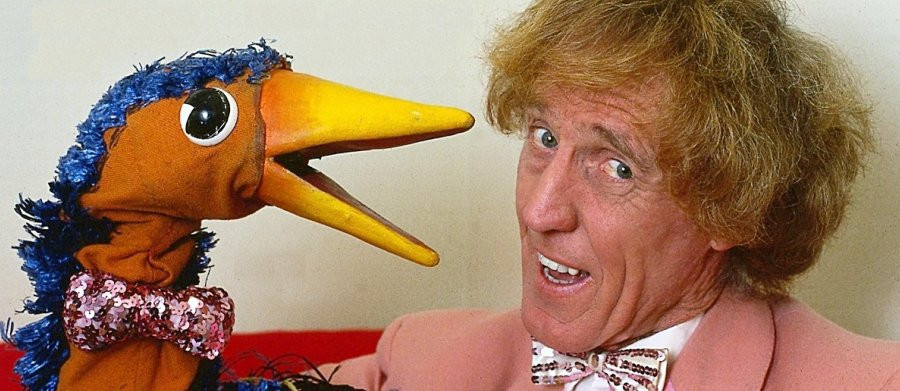
Rod Hull
Throughout the 1970s and 1980s, children’s programming presented a choice between the BBC and its rival ITV. It was rare that one act would be able to appeal to different generations of children across both, and even more unusual if that performer was able to appeal to adult audiences at the same time.
In Rod Hull, and of course his puppet Emu, television gave us an act beloved by children, feared by celebrities and applauded by adult audiences. And yet when the career turned sour, Hull would eventually come to dislike the puppet he had carried with him and the riches of his career would disappear altogether.
Hull would always contest that the bird that made him famous prevented him from success in other areas, and it was his lesser known skills as a writer that would initially lead him to Emu. Although serving in the RAF and qualifying as an electrician, Rod Hull would leave the UK for Australia in 1958 at the suggestion of his sister Joan and it was here that he obtained his first job in television, working as a lighting technician for Channel 9. Hull would eventually gain a role on screen as Constable Clot, becoming successful enough to get his own sketches.
During his time in Australia he would flex his writing muscles for a number of shows, with both adult and child audiences, and it was during this time that he happened upon the puppet that would catapult him to stardom. Hull always claimed that he found Emu in a cupboard, albeit also claiming that he put Emu in said cupboard in the first place. Much debate continued through the years as to whether Emu really was Hull’s creation, but in the grand scheme of things, it mattered not.
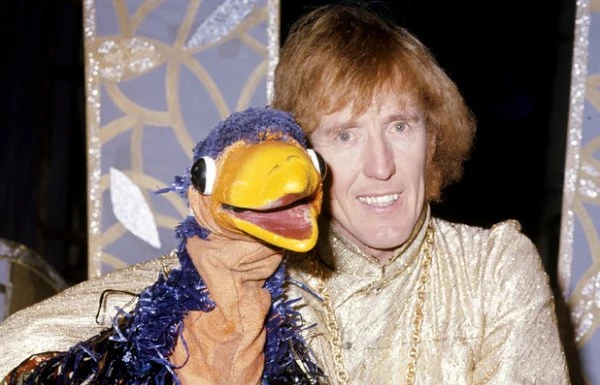
Hull returned to the UK in 1970 and reportedly used Emu as a gimmick to gain the attention of International Artists. The chaos the bird persona brought did its trick and within a year Hull was booked onto the Royal Variety Performance, an evening that would transform his career. Comedian Dickie Henderson was the first person that the British television public would see mauled by the giant bird, subsequently followed by the undignified demise of the Queen Mother’s bouquet in the after-show royal line-up. Hull was largely unperturbed by the identity of his potential victims, loving rebelling against the norm.
In 1975, Emu’s Broadcasting Company was born and became an established part of the BBC’s schedule. The variety show format it took was that of a chaotic television station. Hull would appear as co-host, not always with Emu, with many jokes written by him, and ably supported by comedian Billy Dainty and Barbara New as the tea lady. It was a pastiche of magazine programmes such as Noel Edmond’s Multi-coloured Swap Shop and included mock news and weather segments, as well as absurd scenarios for odd job man Dainty to perform. It even allowed the revolving globe of BBC1 to be interfered with into EBC1.
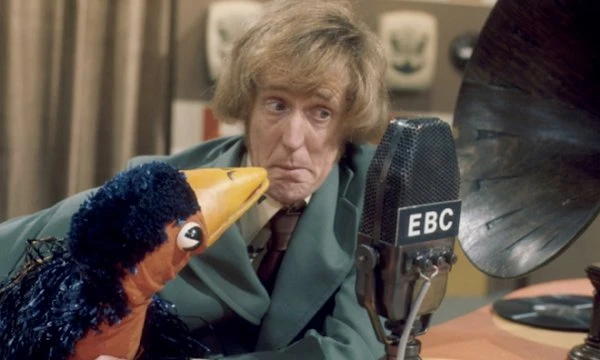
Hull’s success was massive. The show ran for five seasons with a host of specials and during that time he was a regular guest on many a talk or variety show. Audiences knew that they would simply be greeted by Rod Hull trying to explain away Emu’s occasional loss of control or perhaps demonstrate a new trick, followed by a brief lull where Emu appears to be at peace with his surroundings. ‘You see, he likes you,’ would invariably be followed by an all-out attack which would leave host, guest or fellow performer with a puppet beak around his mouth and the stage floor for a seat.
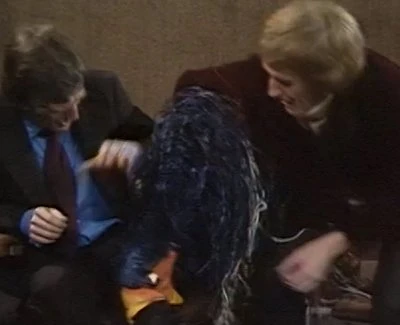
It’s hard to pinpoint why Hull’s act was so successful, given the apparent predictability, but the uncontrolled chaos was lapped up by young and old alike. Most notorious was of course the appearance of Hull on Parkinson, the most respected chat show of its time, in 1976. Inevitably, calm conversation would turn to chaos and after being spun around in his chair several times, the disgruntled, normally unflappable Yorkshireman found himself sat on the floor, hair in a mess and minus a shoe. He would bemoan Hull’s behaviour for many years, although he would reciprocate the appearance by taking a guest slot on Emu’s Broadcasting Company. It was less the actions of Hull and his accomplice itself and more the audience reaction, as the Emu attack would outshine many of Parkinson’s more conventional guest stars!
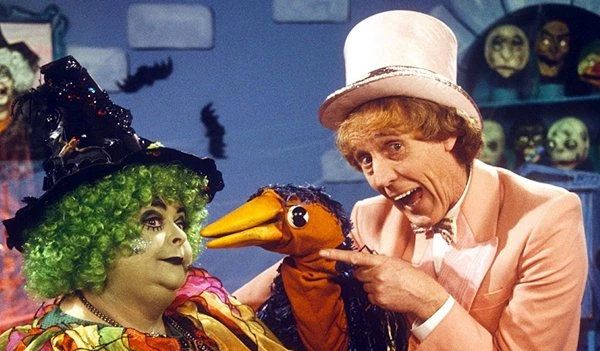
Hull eventually jumped ship from the BBC, turning to Central to produce Emu’s World. Unlike Emu’s Broadcasting Company, this was a format directed specifically at children. It carried a pantomime feel, with children singing and dancing, a children’s audience and recurring bad guys in the form of the wonderful Carol Lee Scott as Grotbags and her sidekick Croc. Her character would be so successful that it would outlast even Hull and Emu when the show eventually wrapped up in the late 1980s.
Hull’s career brought him fame and fortune, but it was to be his undoing.
He had purchased a manor house that was in a sorry state of repair, called Restoration House. Hull’s finances were plunged into the building, which turned out to be a disastrous money pit. At the same time, his show began to lose its relevance and accounts showed back taxes were owed and so Hull, unable to shift the house for even a fraction of its original cost, was declared bankrupt in 1994.
As soon as his money had gone, the phone stopped ringing. Emu was no longer on our screens and Hull was reduced to private-hire performances and the occasional guest spot and he spent his later days at a small cottage in the West Sussex countryside. He enjoyed a quieter life, but seemed content in his more moderate surroundings. It was here in 1999 that Hull would meet his sad demise, however, falling from his roof to his death while trying to adjust his television aerial.
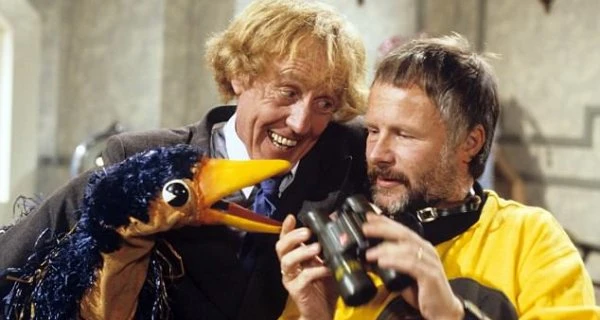
Hull felt that Emu had held him back from other successes. It was well known that when not on stage, the Emu puppet that had brought so much success was ignominiously tossed into its case rather than treated like a genuine character of its own. Hull felt that he could not express his own personality or creativity while the public craved the anti-social behaviour of the bird. Indeed he once bemoaned that he would happily have been a guest on shows like Parkinson without his accomplice, but booking executives wanted Rod Hull and Emu, not Rod Hull the solo performer.
It would be wrong to dismiss Hull as childish antics or simply an excuse for television anarchy and cheap laughs. There is much to be admired about the care in his performances. Indeed there is an element of Marx Brothers anarchy both in Emu’s behaviour and the dynamic between the two. We are regularly treated to Hull explaining his mute side-kick’s behaviour before his silent compatriot unleashes his chaotic persona. It is not at all dissimilar to the many occasions Chico Marx explains the eccentric, physical and chaotic antics of Harpo…and just as with Harpo in the Marx Brothers movies, we cannot help but be drawn to the rebellious but hysterical behaviour that Emu displays.
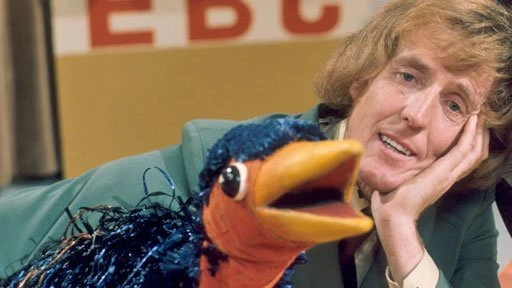
The attack on Parkinson is one of the television events of the 1970s, up there with Frank Spencer hanging over a cliff from the bumper of a Morris Minor and Basil Fawlty giving his own misbehaving car a damn good thrashing. And as much as we can still find hysterical moments of madness from the speechless bird that brought us such comedy gold, behind it all was a mild mannered gentleman described by his most famous victim, Michael Parkinson, as ‘a very gentle man and an endearing companion.’
About the reviewer: Brian Slade
Born and raised in Dorset, Brian Slade turned his back on a twenty-five-year career in IT in order to satisfy his writing passions. After success with magazine articles and smaller biographical pieces, he published his first full-length work, `Simon Cadell: The Authorised Biography'.
Brian is a devoted fan of the comedy stars of yesteryear, citing Eric Morecambe, Ken Dodd, Harpo Marx and Dudley Moore amongst his personal favourites. He was drawn to the story of Simon Cadell through not only `Hi-de-hi!' but also `Life Without George', a programme he identified with having grown up in the Thatcher era.
Published on December 10th, 2019. Written by Brian Slade for Television Heaven.









